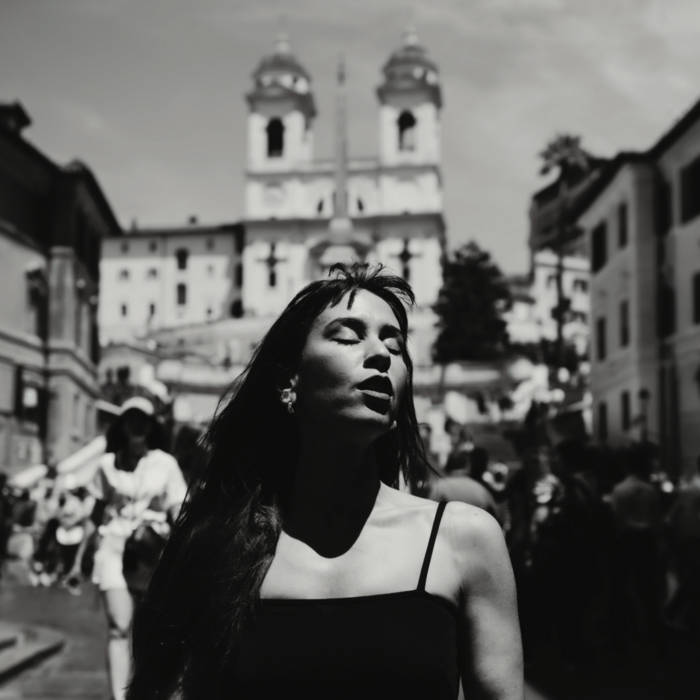De Italiaanse zangeres Lavinia Mancusi brengt op haar nieuwe album A Cruda Voz een ode aan het leven.
English version below
Lavinia Mancusi heeft een grote vocale overtuigingskracht waarmee ze je op haar album A Cruda Voz (De Rauwe Stem) meeneemt in een wereld waar thema’s als geboorte, liefde, lijden, dood en wedergeboorte aan bod komen. Mancusi zingt, speelt gitaar, viool en percussie. Daarbij wordt ze omringd door de vakkundige musici: Iacopo Schiavo (klassiek gitaar en ûd/Arabische luit), blazer Renato Vecchio, elektrisch gitarist Alessandro Chimienti en accordeonist Mauro Menegazzi die ook synthesizer speelt en verantwoordelijk is voor de arrangementen.
Menegazzi drukt een grote stempel op de productie. Naast het (virtuoos) gebruik van accordeon, gitaar, ûd en synthesizers, maakt hij gebruik van ritme-loops, veel galmen, audio-sounds (zee, stemmen) en onverwachte wendingen in de arrangementen. De originele melodieën blijven in tact en zijn ongewijzigd, maar de arrangementen geven het een hele nieuwe kleur en timbre. Alle liedjes vloeien als één groot lied in elkaar over, waardoor er eigenlijk een grote compositie ontstaat. De stukken zijn zowel traditioneel, als ook werken van de grote sterren Matteo Salvatore en Roberto De Simone (oprichter van Nuova Compagnia di Canto Popolare).
De vocalen van Lavinia Mancusi hebben een brede, emotionele reikwijdte. Haar stem fluistert, huilt en klinkt aangrijpend, maar is daarnaast ook lyrisch, melancholisch en hartverscheurend. Ze zingt bevlogen en met een ferme uitstraling die door de afwisselende arrangementen nog meer diepgang krijgt. Prachtig is de meerstemmigheid in Il lamento dei mendicanti en Padre Mia met originele en sobere percussieve begeleiding. Vooral het gebruik van de accordeon (mooie solo in A Curuna) en het gebruik van de Arabische luit, naast de synthesizer en percussie, maakt de muziek spannend en soms zelfs ongrijpbaar. Jammer dat er nergens een (engelse) vertaling te vinden is van de Italiaanse lyrics. Maar toch, ook zonder dat je de tekst begrijpt, blijft dit album een meesterwerk!
English version
Italian singer Lavinia Mancusi brings an ode to life on her new album A Cruda Voz.
Lavinia Mancusi has a great vocal persuasiveness with which she takes you on her album A Cruda Voz (The Raw Voice) into a world where themes such as birth, love, suffering, death and rebirth are addressed. Mancusi sings, plays guitar, violin and percussion. She is surrounded by skilled musicians: Iacopo Schiavo (classical guitar and ûd/Arabic lute), wind player Renato Vecchio, electric guitarist Alessandro Chimienti and accordionist Mauro Menegazzi who also plays synthesizer and is responsible for the arrangements.
Menegazzi leaves a big mark on the production. In addition to the (virtuoso) use of accordion, guitar, ûd and synthesizers, he uses rhythm loops, lots of reverb, audio sounds (sea, voices) and unexpected twists in the arrangements. The original melodies remain intact and unchanged, but the arrangements give it a whole new color and timbre. All the songs flow into each other as one large song, which actually creates one large composition. The pieces are both traditional, as well as works by the great Matteo Salvatore and the wonderful Roberto De Simone (founder of Nuova Compagnia di Canto Popolare).
Lavinia Mancusi’s vocals have a broad, emotional range. Her voice whispers, cries and is moving, but is also lyrical, melancholic and heartbreaking. She sings passionately and with a firm charisma that gains even more depth through the varied arrangements. The polyphony in Il lamento dei mendicanti and Padre Mia are beautiful, with original and sober percussive accompaniment. Especially the use of the accordion (beautiful solo in A Curuna) and the use of the Arabic lute, next to the synthesizer and percussion, makes the music exciting and sometimes even elusive. Too bad there are no (English) translations of the lyrics to be found anywhere. But still, even without understanding the text, this album remains a masterpiece!
- Lavinia Mancusi: A Cruda Voz (Liburia Records/ Xango)
© Mattie Poels.


Geen reacties